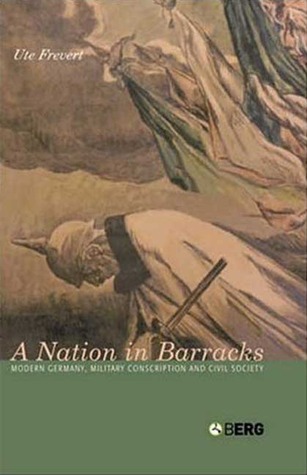
| Title | : | A Nation in Barracks: Modern Germany, Military Conscription and Civil Society |
| Author | : | |
| Rating | : | |
| ISBN | : | 1859738869 |
| ISBN-10 | : | 9781859738863 |
| Language | : | English |
| Format Type | : | Paperback |
| Number of Pages | : | 288 |
| Publication | : | First published September 1, 2004 |
A Nation in Barracks: Modern Germany, Military Conscription and Civil Society Reviews
-

This book is a history of conscription in Germany, looked at through three lenses: citizenship, nation-building, and the gender order. Frevert ties German conscription together with European (largely French) concepts of national identity, which allowed the private citizen to see himself as part of the larger national community, and to dedicate himself to it (the "himself" here is quite conscious and specific, of course). She points out in the introduction, however, that a competing model for a Western army has long existed, in the form of the professional volunteer armies of Britain and the United States, and she argues that since the Second World War, this model has gained currency in Germany and is likely the future for the German military. In that sense, although conscription continues in Germany to this day, her book may be seen as a more-or-less complete history of the subject.
The narrative begins before German unification (more or less with Napoleon), although the move towards unification is neatly linked with her subject. Where nation building in France ("Peasants into Frenchmen," to use Eugen Weber's term) was a process of including the people who had previously been "subjects" of a monarch into a national community which ostensibly represented them, in Germany it meant first and foremost the right of Germans to consider themselves part of one community, while their representation or "voice" within that community was a secondary consideration at best. The metaphor of a "nation in barracks," therefore implied a relationship of service from duty, not one of service to gain a reward (such as enfranchisement).
Military historians may be confused or annoyed by the emphasis on the maintenance of a peacetime army, but this serves to support Frevert's argument that the real value of conscription was domestic unity, not strength in international relations. She uses a wide variety of interesting sources, from traditional soldiers' songs, to newspaper accounts to training manuals to government documents, to trace a narrative which is not obvious to the "naked eye" of military campaigns and battles. Most of the book is dedicated to the 19th century, although the final chapter includes a very good analysis of the twentieth, pointing out how certain aspects of traditional conscription rose and fell as Germany left its imperial era, moved fumblingly through democracy into totalitarianism and back to a more stable democratic model.
Some feminist historians will be disappointed or concerned by the use of gender analysis to support a book which is more or less entirely about men and the male experience, but Frevert deftly applies gender to teach us about both sides of the equation. She asks why military service and thus "citizenship" have been perceived as male provenances and also discusses the debates and effects of female service in the military and its invisibility throughout much of German history. As with any good history, this tells us not merely the story of specific individuals or populations, but allows us to learn something of our own lives and values and their origins.







